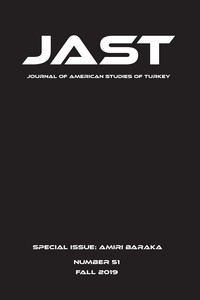Abstract
Amiri Baraka’s well-known and both vastly praised and criticized
play Dutchman is a primary example of Revolutionary Theater,
which Baraka conceptualizes as a theater that “forces” its audience
to confront the realities of social injustice, and “accuse” and “attack”
its practitioners. In this sense, Dutchman is a model text of Baraka’s
compulsion toward destruction through art. This article argues that the
prevalent view in the scholarship on this play reduces Clay and Lula as
victim and victimizer. This article aims to present these characters in a
postmodernist light, as more complex and less stereotyped. Thus, they
can be seen as having equally the potential to change and the potential
to destroy (themselves and/or the society). In the final analysis, Baraka
presents a true piece of Revolutionary Theater in Dutchman: powerful,
accusatory and destructive.
Keywords
Amiri Baraka American Literature American Poetry LeRoi Jones/Amiri Baraka Dutchman Revolutionary Theatre Myths Intertextuality Deconstruction
References
- Achilles, Jochen. “Allegory and Iconography in African American Drama of the Sixties: Imamu Amiri Baraka’s Dutchman and Alice Childress’s Wine in the Wilderness.” Amerikastudien/ American Studies, vol. 45, no. 2, 2000, pp. 219–238. JSTOR, www.jstor.org/stable/41157564.
- Adams, George R. “My Christ in Dutchman.” College Language Association Journal, vol. 15, 1971, pp. 54-58.
- Alfaro, María Jesús Martínez. “Intertextuality: Origins and Development of the Concept.” Atlantis, vol. 18, no. 1/2, 1996, pp. 268-285. JSTOR, www.jstor.org/stable/41054827.
- Baker, Christopher. “A Trip with the Strange Woman: Amiri Baraka’s Dutchman and the Book of Proverbs.” South Atlantic Review, vol. 78, no. 3/4, 2013, pp. 110-128. JSTOR, www.jstor.org/ stable/43739218.
- Baraka, Amiri. Dutchman. Anthology of American Literature. Vol II: Realism to the Present, edited by George McMichael, et. al., MacMillan Publishing, 1980, pp. 1896-1908.
- ---. The Autobiography of LeRoi Jones. Lawrence Hill Books, 1997.
- ---. “The Revolutionary Theater” Liberator, July 1965 National Humanities Center Resource Toolbox: The Making of African American Identity: Vol. III, 1917-1968, pp.1-3.
- Bonner, Willard Hallam. “The Flying Dutchman of the Western World.” Journal of American Folklore, vol. 59, no. 233, 1946, pp. 282- 288. JSTOR, www.jstor.org/stable/536251.
- Brown, Lloyd W. Amiri Baraka. G.B. Hall and Co., 1964. Derrida, Jacques. Margins of Philosophy. Translated by Alan Bass, U of Chicago P, 1982.
- Fanon, Frantz. Black Skins, White Masks. Pluto Books, 2008.
- Gohar, Saddik. “The Complicated Interfaces of Symbolism and Myth in Dutchman” International Journal of English Literature and Culture, vol. 6, no. 1, 2018, pp. 7-12.
- Johnson, Barbara. “Writing.” Critical Terms for Literary Study, edited by Frank Lentricchia and Thomas McLaughlin, U of Chicago P, 1990, pp. 39-49.
- Kern, Douglas. Killing in the Name of Struggle: Amiri Baraka’s Revolutionary Theatre. The University of York. PhD dissertation, 2014.http://etheses.whiterose.ac.uk/6365/1/Final%20 Submission%20PhD.pdf
- Kristeva, Julia. The Kristeva Reader. Edited by Toril Moi. Columbia UP, 1986.
- Kumar, Nita N. “The Logic of Retribution: Amiri Baraka’s Dutchman.” African American Review, vol. 37, no. 2/3, 2003, pp. 271-279. JSTOR, www.jstor.org/stable/1512313.
- Lee, A. Robert. Designs of Blackness: Studies in the Literature of African-America, Pluto Press, 1998. ProQuest Ebook Central,http://ebookcentral.proquest.com/lib/halictr/detail. action?docID=3386112.
- Martin, Thaddeus. “Dutchman Reconsidered.” Black American Literature Forum, vol. 11, no. 2, 1977, p. 62. JSTOR, www.jstor. org/stable/3041574.
- Matlin, Daniel. “‘Lift up Yr Self!” Reinterpreting Amiri Baraka (LeRoi Jones), Black Power, and the Uplift Tradition.” Journal of American History, vol. 93, no. 1, 2006, pp. 91-116. JSTOR, www.jstor.org/stable/4486061.
- Neal, Larry. “The Black Arts Movement.” A Sourcebook on African-American Performance: Plays, People, Movements, edited by Annemarie Bean, Routledge, 1999. ProQuest Ebook Central, http://ebookcentral.proquest.com/lib/halictr/detail. action?docID=166118.
- Nelson, Hugh. “LeRoi Jones’ Dutchman: A Brief Ride on a Doomed Ship.” Educational Theatre Journal, vol. 20, no. 1, 1968, pp. 53- 59, JSTOR, www.jstor.org/stable/3204875.
- Nuyen, A. T. “Derrida’s Deconstruction: Wholeness and Différance.” Journal of Speculative Philosophy, vol. 3, no. 1, 1989, pp. 26- 38, JSTOR, www.jstor.org/stable/25669901.
- Taylor, Willene P. “The Fall of Man Theme in Imamu Amiri Baraka’s [Le Roi Jones’] Dutchman.” Negro American Literature Forum, vol. 7, no. 4, 1973, pp. 127-131, JSTOR, www.jstor.org/ stable/3041441.
- Reid, Calvin. “Amiri Baraka: Fierce Fictions, Radical Truths” Publishers Weekly, May 1, 2000. 247, 18; ABI/INFORM Collection p. 44.
- Smith, David L. “Amiri Baraka and the Black Arts of Black Art.” Boundary 2, vol. 15, no. 1/2, 1986, pp. 235-254. JSTOR, www.jstor.org/stable/303432.
- Weisgram, Dianne H. “LeRoi Jones’ Dutchman: Inter-Racial Ritual of Sexual Violence.” American Imago, vol. 29, no. 3, 1972, pp. 215-232. JSTOR, www.jstor.org/stable/26302722.
- Zengin, Mevlüde “An Introduction to Intertextuality as a Literary Theory: Definitions, Axioms and the Originators” Pamukkale Üniversitesi Sosyal Bilimler Enstitüsü Dergisi, vol. 25, no.1, 2016, pp. 299-326.
Details
| Primary Language | English |
|---|---|
| Subjects | North American Language, Literature and Culture, Literary Studies |
| Journal Section | Research Articles |
| Authors | |
| Publication Date | November 1, 2019 |
| Published in Issue | Year 2019 Issue: 51 |
JAST - Journal of American Studies of Turkey


